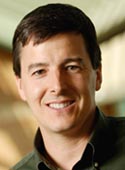Date
Cost
Free and open to the public
Location
CREOL, Room 102
Description
Recent advances in materials science and mechanical engineering enable construction of high performance optical, electronic and mechanical microsystems that can flex, bend, fold and stretch, with ability to accommodate large (>>1%) strain deformation with a purely elastic mechanical response. Such technologies open up new engineering opportunities in bio-inspired device design and in intimate, multifunctional interfaces to the human body. This talk summarizes fundamental and applied aspects of two recent examples: (1) hemispherical digital imagers that incorporate essential design features found in the arthropod eye and (2) injectable, cellular-scale light emitting diodes for wireless control of complex behaviors in animal models, via the techniques of optogenetics.
Professor John A. Rogers obtained BA and BS degrees in chemistry and in physics from the University of Texas, Austin, in 1989. From MIT, he received SM degrees in physics and in chemistry in 1992 and the PhD degree in physical chemistry in 1995. From 1995 to 1997, Rogers was a Junior Fellow in the Harvard University Society of Fellows. He joined Bell Laboratories as a Member of Technical Staff in the Condensed Matter Physics Research Department in 1997, and served as Director of this department from the end of 2000 to 2002. He is currently Swanlund Chair Professor at University of Illinois at Urbana/Champaign, with a primary appointment in the Department of Materials Science and Engineering. He is also Director of the Seitz Materials Research Laboratory. Rogers’ research includes fundamental and applied aspects of materials and patterning techniques for unusual electronic and photonic devices, with an emphasis on bio-integrated and bio-inspired systems. He has published more than 450 papers and is inventor on over 80 patents, more than 50 of which are licensed or in active use. Rogers is a Fellow of the IEEE, APS, MRS and AAAS, and he is a member of the National Academy of Engineering and the American Academy of Arts and Sciences. His research has been recognized with many awards, including a MacArthur Fellowship in 2009, the Lemelson-MIT Prize in 2011 and, in 2013, the MRS Mid-Career Researcher Award, the ASME Robert Henry Thurston Award and the Smithsonian Award for American Ingenuity in the Physical Sciences. In 2013 he also received an Honoris Causa Doctorate from the École Polytechnique Fédérale de Lausanne.
Presenter

John Rogers, Ph.D.
Department of Material Science and Engineering
Frederick Seitz Materials Research Laboratory
Beckman Institute
University of Illinois at Urbana-Champaign
More information
Light refreshments will be served.
Contact
Debashis Chanda NanoScience Technology Center Debashis.Chanda@ucf.edu